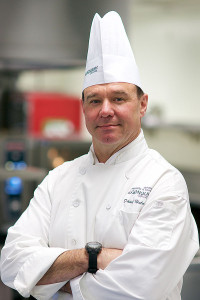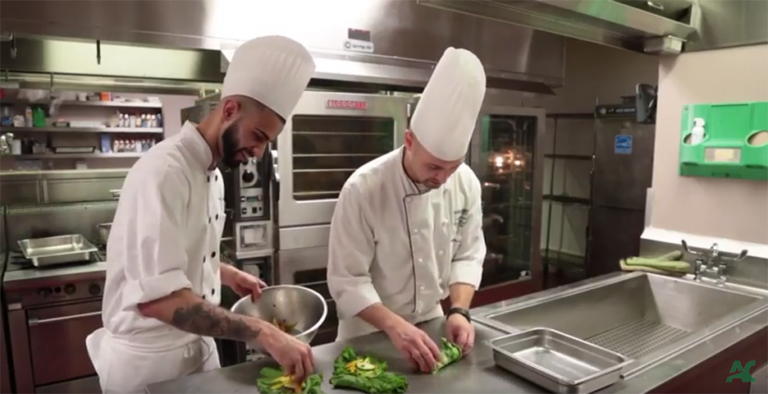Culinary Skills - Cook II Apprenticeship
Graduates from the Culinary Skills - Cook II Apprenticeship Ontario College Certificate program are equipped with the industry experience they need for a successful culinary career.
- The nation's capital offers many restaurant opportunities for the one year of industry work required
- Learn the skills required for professional food preparation from professional chefs in Algonquin College's world-class culinary labs
- Benefit from real-world experience on campus in Restaurant International, Algonquin College's own fine-dining training restaurant
Program Availability and Schedule
Schedule
Data is currently unavailable for this program. Please take a moment to report this via our Website Feedback Form. Thank you!
Program Summary
Credential
Program Delivery
Program Code
Area of Interest
School
Campus
In the culinary industry, it is important to be well-organized, have attention to detail and be able to work efficiently under time constraints. You learn the skills required for professional food preparation from highly-qualified instructor chefs in Algonquin College`s world-class culinary labs.
Begin the program by completing 14 weeks of in-class instruction, followed by one year of work in the industry. Expand your work experience portfolio and gain valuable contacts before returning to Algonquin College to complete another 14 weeks of in-class learning....(read more)
Overview
Graduates from the Culinary Skills - Cook II Apprenticeship Ontario College Certificate program are equipped with the industry experience they need for a successful culinary career. By combining learning with industry work, this program gives you the skills, knowledge and confidence to excel in a culinary team.
In the culinary industry, it is important to be well-organized, have attention to detail and be able to work efficiently under time constraints. You learn the skills required for professional food preparation from highly-qualified instructor chefs in Algonquin College`s world-class culinary labs.
Begin the program by completing 14 weeks of in-class instruction, followed by one year of work in the industry. Expand your work experience portfolio and gain valuable contacts before returning to Algonquin College to complete another 14 weeks of in-class learning.
Receive hands-on instruction in food preparation techniques, artistic plating presentation, and basic business skills, so that you can comfortably join a culinary team. In the culinary industry, it is important to be well-organized, attentive to detail and able to work efficiently under time constraints.
Some classes are held in the evening and on the weekend in Restaurant International, Algonquin College`s on-campus fine dining restaurant, to give you a taste of your career after graduation. After completing the second level of in-class sessions, you receive 720 hours towards the 6,000 hours you`ll need to write the Red Seal cook certification exam.
You may find employment as an assistant cook or cook in a variety of food service settings, both locally and globally at:
- hotels
- resorts
- catering organizations
- corporate food service departments
Further training can open doors for advancement into the roles of sous-chef, chef, executive chef and other managerial positions.
To learn more about apprenticeships, visit www.ontario.ca/page/skilled-trades for detailed information.
SUCCESS FACTORS
This program is well-suited for students who:
- Seek variety and opportunity in their career.
- Are well-organized, attentive to detail and can work effectively under tight time constraints.
- Are energetic, outgoing and enjoy working with others.
Courses
Programs at Algonquin College are delivered using a variety of instruction modes. Courses may be offered in the classroom or lab, entirely online, or in a hybrid mode which combines classroom sessions with virtual learning activities. Upon registration, each full-time student is provided an Algonquin email account which is used to communicate important information about program or course events.
Code:
FOD2102
Course Name:
Trade Calculations and Computer Applications
Course Description:
In order to select appropriate menu prices, culinary professionals must be able to calculate the cost of individual portions and recipes, as... + Read More
Hours:
14.0
Code:
FOD2103A
Course Name:
Sanitation and Safety Training
Course Description:
An awareness of key regulations and requirements is a necessity in order to be equipped for the hands-on and practical components of a caree... + Read More
Hours:
14.0
Code:
FOD2105A
Course Name:
Farm to Fork
Course Description:
Understanding the relationships throughout the food service industries in Canada is crucial to working in the various stages of food product... + Read More
Hours:
42.0
Code:
FOD2111A
Course Name:
Culinary Techniques I
Course Description:
Students focus on foundational cooking methods and organizational skills. Students butcher, cook and taste a variety of meats, poultry and f... + Read More
Hours:
70.0
Code:
FOD2119A
Course Name:
Introduction to Baking and Pastry
Course Description:
Students learn the basic concepts, skills and techniques of baking. Emphasis is placed on identification of products, weights and measures. ... + Read More
Hours:
42.0
Code:
FOD2129A
Course Name:
Nutrition and Food Preparation
Course Description:
A poor diet may have a harmful impact on health, and many food service customers in contemporary society have specific nutritional and dieta... + Read More
Hours:
28.0
Code:
FOD2197A
Course Name:
Culinary Restaurant Operations
Course Description:
Drawing from concepts learned in previous courses, students are introduced to cooking in a restaurant environment in the College's Restauran... + Read More
Hours:
98.0
Code:
FOD2126A
Course Name:
Culinary Techniques II
Course Description:
Students expand on the core cooking principles introduced in semester one. Students will focus on advanced culinary techniques with an empha... + Read More
Hours:
70.0
Code:
FOD2189A
Course Name:
Contemporary Banquet and Restaurant Operations
Course Description:
This course expands the skills and knowledge obtained in Year 1 by focusing on different service styles within the culinary industry. Studen... + Read More
Hours:
126.0
Code:
FOD2250A
Course Name:
Advanced Culinary Operations
Course Description:
This course expands the skills and knowledge obtained in semester 3 by having students cook a variety of new dishes using more advanced skil... + Read More
Hours:
35.0
Code:
FOD2253A
Course Name:
Pastry and Plating Techniques
Course Description:
Building on the skills acquired in Introduction to Baking and Pastry, students observe and prepare both hot and cold plated desserts. Emphas... + Read More
Hours:
42.0
Code:
HOS2131
Course Name:
Menu Planning
Course Description:
Students gain the necessary skills, using computer applications, to develop menus for the many sectors of the hospitality industry, includin... + Read More
Hours:
42.0
Code:
HOS2236
Course Name:
Food and Beverage Management
Course Description:
Students acquire a practical foundation in food, beverage and labour operations. Students also learn the process to control and reduce costs... + Read More
Hours:
56.0
Careers & Pathways
Careers
There is a strong demand for trained chefs and the food and beverage industry is now offering good salaries and working conditions to attract skilled personnel. Graduates may find employment in a variety of food service settings. Positions may include assistant cooks and cooks in hotels, resorts, catering organizations and corporate food service departments. Further training may open opportunities for advancement to positions such as sous-chefs, chefs, executive chefs and other supervisory roles.
Pathways
Please use our Pathways tool to search for pathway options.
Learning Outcomes
The graduate has reliably demonstrated the ability to:
- Provide fundamental culinary preparation and presentation for a variety of food service environments using a range of classical and contemporary techniques.
- Apply basic food and bake science to food preparation to create a desired end product.
- Contribute to and monitor adherence of others to the provision of a well-maintained kitchen environment and to the service of food and beverage products that are free from harmful bacteria or other contaminants, adherin to health, safety, sanitation and food handling regulations.
- Ensure the safe operation of the kitchen and all aspects of food preparation to promote healthy work spaces and the responsible, efficient use of resources.
- Support the development of menu options that reflect knowledge of nutrition and food ingredients, promote general health and well-being, respond to a range of nutritional needs and preferences and address modifications for special diets, food allergies and intolerances, as required.
- Apply fundamental business principles and recognized industry costing and control practices to food service operations to promote a fiscally responsible operation.
- Apply basic knowledge of sustainability, ethical and local food sourcing, and food security to food preparation and kitchen management, recognizing the potential impacts on food production, consumer choice and operations within the food service industry.
- Use technology, including contemporary kitchen equipment, for food production and promotion.
- Perform effectively as a member of a food and beverage preparation and service team and contribute to the success of a food-service operation by applying self-management and interpersonal skills.
- Develop strategies for continuous personal and professional learning to ensure currency with and responsiveness to emerging culinary techniques, regulations, and practices in the food service industry.
Tuition & Fees
Get an idea of how much each semester will cost with our Tuition and Fee Estimator.
2023/2024 Academic Year
Tuition Fees: $600 per level.
Incidental Fee: $150 per level.
Information Technology Fee: $164.44 per level.
Books, knives and supplies cost approximately $1,200 to $1,500 in the first year and $600 in the second year and can be purchased at the campus store.
Approved cook uniforms, embroidered with the School and College logo, must be purchased at the campus store.
Laptop required.
Admissions Requirements
All applicants must satisfy both College Eligibility and Program Eligibility requirements.
College Eligibility
- Ontario Secondary School Diploma (OSSD) or equivalent; OR
- Mature Student status (19 years of age or older and without a high school diploma at the start of the program).
Program Eligibility
- Prospective students must be registered apprentices with the Ministry of Labour, Training and Skills Development and must be a member in good standing with Skilled Trades Ontario (STO).
- Eligibility is determined by the Ministry of Labour, Training and Skills Development.
Application Information
CULINARY SKILLS - COOK II APPRENTICESHIP
Program Code 0346X01FWO
Registration for Apprenticeship programs takes place through the Ministry of Labour, Training, and Skills Development.
For further information, contact:
Ministry of Labour, Training, and Skills Development Division
347 Preston Street, 3rd Floor, Suite 310
Ottawa, ON K1S 3H8
https://www.ontario.ca/page/start-apprenticeship
Telephone: 613-731-7100
Toll-free: 1-877-221-1220
Additional Information
Program Resources
Completion of St. John Ambulance First Aid course is strongly recommended.
Apprenticeship Incentive Grant:
The Apprenticeship Incentive Grant is a taxable cash grant of $1,000 per year or level, up to a maximum amount of $2,000 per person. The grant is for registered apprentices who successfully complete the first or second year/level (or equivalent) of an apprenticeship program for a designated Red Seal trade.
Application Deadline:
June 30 of the calendar year, after you complete the first or second level of our apprenticeship program. Find out if you are eligible for and how to apply for the Apprenticeship Incentive Grant: http://www.servicecanada.gc.ca/eng/goc/apprenticeship/incentivegrant/program.s
Get Financial Help:
http://www.servicecanada.gc.ca/eng/goc/apprenticeship/incentivegrant/program.s
Employment Ontario can assist in finding an employer sponsor.
Contact
Dan Halden
Program Coordinator
Room H204b

Chef Daniel Halden was raised in Ottawa, Ontario and discovered his culinary passion while entertaining friends and family in his teenage years. Chef Halden came to study at Algonquin College where he completed the Culinary Management Program. Since then, he has landed culinary positions at the National Art Centre, Ottawa Congress Centre, and many of Ottawa’s fine bistros and restaurants. He most recently held the position of Executive Chef at the Embassy West Hotel, Conference Centre. In 1999, Chef Halden joined the teaching staff at Algonquin College’s School of Hospitality. Chef Halden has many food-related passions such as coffee, wine and food matching and has added a “back-to-basics” approach that includes charcuterie, pickling and preserving and beekeeping.
